Camping is a wonderful outdoor activity that allows you to relax in the middle of nature with your friends and family. But, every lovely activity in the outdoor can transform into a nightmare if you don’t have the necessary gear and if you are not prepared. People who love the outdoor and those who have been camping ever since they were infants know that it’s very important to be prepared and to know what to bring camping.
[the_ad_placement id=”in-text-1-type-r”]We’ve all heard the wonderful stories about camp fires and sleeping under the clear sky of the night. When you come prepared and you have everything you need with you, the camping experience can’t be anything else than memorable. That’s the main reason we decided to talk about what to bring camping. If you’ve been camping at least once in your life, you definitely have some camping equipment somewhere in the house (an old tent, a backpack, and some other things) but camping done right is a little bit more than that.
We’re going to help you put together a list with the basic items you need to take with you when you go on camping. Even if it doesn’t seem so, camping is still an outdoor adventure and you need to be prepared for almost anything.
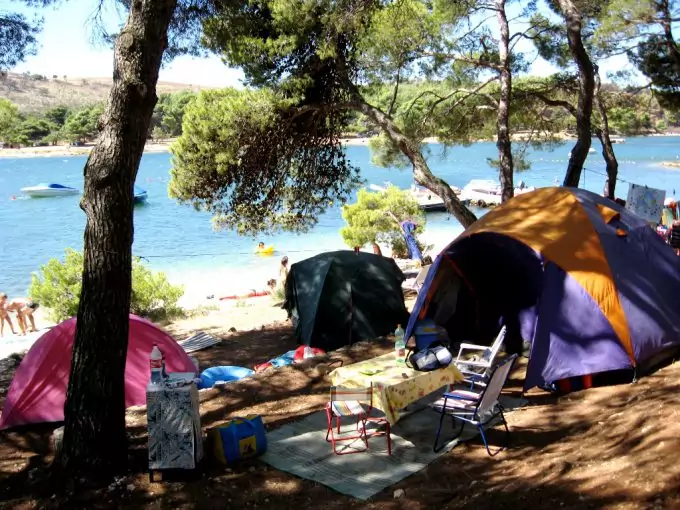
Usually when you think about camping, your mind immediately thinks about relaxation and good time spent with friends and family. In 90% of the cases this is true: we go camping to breathe some fresh air, to admire the nature and to cook some barbeque in big style.
In the other 10% of the cases, camping means resting using an improvised shelter (the tent) during the night, while you are on a real outdoor adventure. People who went on hiking trips or those who like to explore the wild side of Mother Nature know how this goes. Anyways, regardless of the situation you are in, your camping gear should be complete.
Imagine you take your entire family out camping for a few days. You load everyone in the car; you put the equipment in the trunk and start driving. You reach the most amazing camping place and find the perfect spot but when you unload the gear you find out that the tents are missing. You are pretty far away from home to have the possibility to drive back and take them.
What do you do? In this situation there are two main solutions: either everyone sleeps in the car or you use your survival skills and knowledge and build some shelters out of what you can find in the woods. Sleeping in the car can be crowded and very uncomfortable, especially for a big family. Also, building shelter can take time and if you get there in the evening you have to wait for the next day to start the job. The time you spend building shelters is time you could be spending relaxing and having fun. Still, you should have the necessary knowledge for building a shelter in an emergency situation and you can learn more about this from our article on how to build a survival shelter.
As you can see, having the right gear is very important. We always recommend our readers to make lists and put them in a visible spot in the house (like the fridge). This way you make sure you don’t forget anything important.
The basic list for the entire family
In order to make sure you don’t miss anything, start making the list with a few weeks before the actual trip. Designate an area in the house where to store and pack the equipment and other items you consider to be necessary. This way you will be able to cross from the list items you already packed. It’s very easy to make sure you have everything you need for camping if you implement this system. And because the list is in a visible place in the house, every member of the family can bring its contribution.
[the_ad_placement id=”in-text-2-type-r”]To make it even easier you should divide the list into categories of products. This way you have structure and you can get organized. Also make sure to not take too much. If you’re going camping don’t take the entire house with you. It’s best to experience a bit of nature so don’t get all the comfort with you.
Category #1 – the equipment
The tent is the very first thing that comes to mind when you think about camping. A tent offers you shelter and protects you and your things from the natural elements and small wild animals. Today you can find all sorts of tents in different shapes, sizes and fabrics so you’ll need a few ideas to guide you in choosing the right one if you don’t know what to look for.
How to choose the perfect tent for your needs:
Here are the attributes you need to consider when choosing the tent you are going to live in for a few days:
- Size – make sure you know how many people are going to stay in one tent. Tents indications advertize size by number of people that can fit in, without personal space. Now if you’re an outdoor adventurer you don’t really need that extra space but if you travel with your entire family and you use a car to transport the equipment take a bigger tent.
For example, if you’re a family of four, buy a 6 person tent. This way you’ll have room for other stuffs in there like children’s toys and gadgets. If you plan to stay more than a few days, we recommend buying even a bigger tent. Small living space can leave space for frictions and unhappiness. - Comfort – directly proportional with size. If the tent is big, you’ll also have some more comfort inside. Make sure that you have space to change your clothes and to leave some clothes inside. Also a place where you can sit up without having to roll over your partner increases the level of comfort.
- Ease of handle – if you’re a bicker going on an outdoor adventure, you will definitely need something small, light and easy to install. Big family tents offer you lots of space and they even come with windows to ensure proper ventilation. Still, this type of tent can be difficult to handle and even carry so you will need a car and several people to help you install it.
- Shape – there are four basic shapes: A-frame tent, umbrella tent, geodesic tent and the wall tent. Each one of these offers certain living conditions but the most common ones are the A-frame tent for adventurers and the umbrella tent for families.
- Windows and doors – make sure you know the weather conditions of the area you are going to. If it’s humid and warm, your tent must have a good ventilation system. Otherwise the heat will build up inside making the living conditions unbearable. The opposite applies for a cold area.
- Fabric – don’t get cheap when it comes about the fabric the tent is made of. Even if you only need it for a few days a year, good fabric can save you a lot of trouble. Sometimes it happens that a lovely afternoon transforms into a powerful summer rain by night fall. If your tent is made out of good fabric everything will be dry and nice inside, allowing you to continue your lovely time in the nature.
These are the basic characteristics you need to look for when searching for a good tent. After you purchase the one you like make sure to test it at home. When you reach the camping place you need to know how to install the tent. Also make sure that all the zippers are operational and that there are no holes or other problems with the fabric.
Here we have a list with the best tents for camping on the market and their reviews, so make sure to take a look.
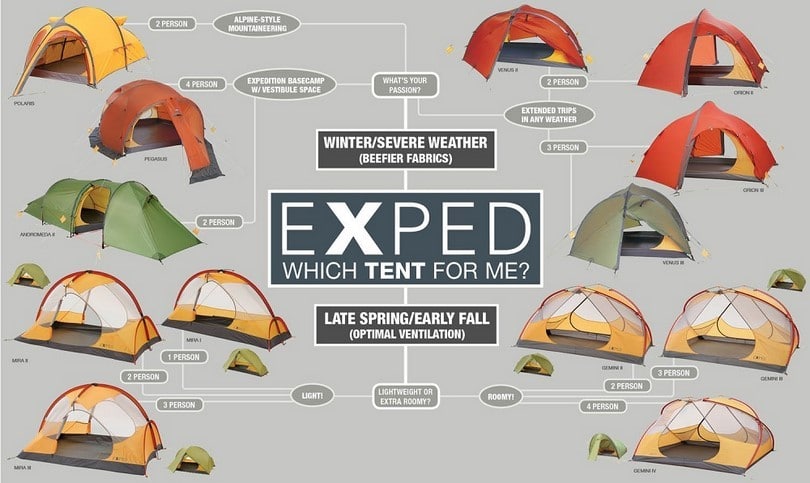
Now that you have the tent, it’s time to think about what equipment you need inside the tent. We recommend leaving pillows and mattresses at home and enjoying camping like true adventurers. So what to bring camping when it comes for bedding?
- Sleeping bags that will keep you warm and cozy. Choose ones that fit the outside temperature in the area. If you have ones for winter you’ll be too warm and if you have ones for summer and it is autumn outside, you’ll be cold. We have reviewed some of the best sleeping bags on the market and you can check out our findings in the best backpacking sleeping bag article.
- Groundsheet to isolate your body from the ground. Even if it’s summer out there you will need this tarp. The ground is cold during the night and your body will lose temperature fast in direct contact. It is recommended to place a layer of leaves, small branches and moss under the tent to act as isolation from the ground.
- Sleeping pad also with the role to isolate you from the cold ground and to improve your level of comfort. We also have a set of reviews on the best backpacking sleeping pad you should check out!
- Air mattress and pump – if you consider you can’t sleep directly on the sleeping pad you should take these items with you. An air mattress is easier to put inside the tent as you can inflate it directly inside.
Other equipment should include an axe (for chopping wood) and a professional knife to make kindling and cut vegetation around. Flashlights shouldn’t be missing from your backpack and lanterns to put inside the tent. Don’t forget about rope and duct tape. These are the universal items you need when something gets broken.
Category #2 – cooking in the nature
We all know that cooking something at a camp fire in the woods (of course, away from trees) is extremely satisfying. The fire and the fresh air give a new flavor to the food and make us feel healthier and better. The satisfaction is even greater when you manage to find your own food in the wild like mushrooms, fruits, fish, and so on.
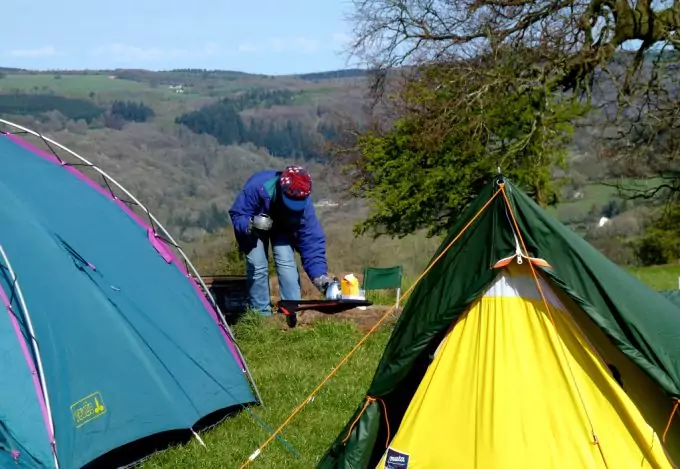
Still, most of the modern campers bring ready to cook food with them. Here is what to bring camping when we talk about kitchen gear:
- Camp stove – if you’re not going to light a fire for cooking you’re going to need something to heat up the food with
- Fuel for the camp stove
- Paper or plastic utensils, plates, mugs – if you don’t want to eat with your hands and directly from the food recipient
- Cutting board and a large bowl – to cut and mix the ingredients when you prepare the food
- Can opener – usually camping food includes cans so you’ll need a can openers for this
- Various pots and frying pans – if you plan cooking big time or if you stay for more than a few days out camping
- Paper towels to wipe your hands and clean up spills
- Grill and fuel for grill – if you’re the outside barbecue kind of person / family
- Large water jug to have water around for cooking and washing the dishes
- Thermos and coolers
- Garbage bags – to gather everything up after you finish eating.
Since its quite difficult to deal with many small things, especially when camping, we recommend purchasing a cookware set designed specially for camping. You can read reviews of the best products in our article here.
As a kitchen related item you can include your fishing gear. Some freshly caught fish will look amazing on the grill or in the pan after a long day of having fun in the nature. Don’t forget about water proof matches and fire starters. Also make sure you get up to date with camping and fire lightning regulations in the area.
Category #3 – clothes and personal items
The same rule applies here too: don’t bring you entire arsenal; only take items that are absolutely necessary. Here is what to take camping in this area:
- An extra change of clothes that will include pants (short and long), shirts (long and short sleeves), underwear, socks, and anything you consider necessary;
- A jacket to keep you warm at night by the fire (even if there’s a hot summer day the temperature drops during the night);
- A hat or bandana to protect you from the sun during the day. Even if it may not seem so, the sun is very powerful in the woods;
- Sleep clothes – avoid to sleep with the same clothes you wear during the day;
- A swim suit if you’re camping on the side of a lake;
- Rain clothes (you never know when you need them);
- An extra pair of sturdy shoes – never go camping without these.
When it comes to personal items, your list should look like this:
- Towels – to get dry after a good swim or simply to dry your hands and face
- Soap and shampoo – if you’re camping in a special area you might have showers there. The soap is necessary to clean your hands before and after you eat.
- Tooth brush and tooth paste
- Deodorant and a folding brush (even if you live in a tent you don’t have to forget about basic hygiene)
- Sunscreen to protect exposed skin (face, neck and arms). You usually don’t feel it but you’ll get burnt by the evening if you don’t protect your skin
- Feminine products
- Toilet paper and other personal items you consider absolutely necessary
If you’re not in a camping area with showers you can improvise one buy getting a shower bag and a shower pump. You hang this on a tree and there you go, you have a shower.
[the_ad_placement id=”in-text-3-type-r”]Don’t forget about medication. If you’re not taking anything prescribed, take some for headaches, stomach pains, and injuries. Also, remember to take the first aid kit with you all the time. Make sure you have fresh bandages, gloves, aluminum foils and so on.
Category #4 – optional items for additional comfort
Regardless of the fact that they go camping in the woods or at the sea shore, many families consider this a vacation and they like to feel as comfortable as possible. Camping is the best way to combine spending time in the outdoor and having fun with the family which is why comfort is important.
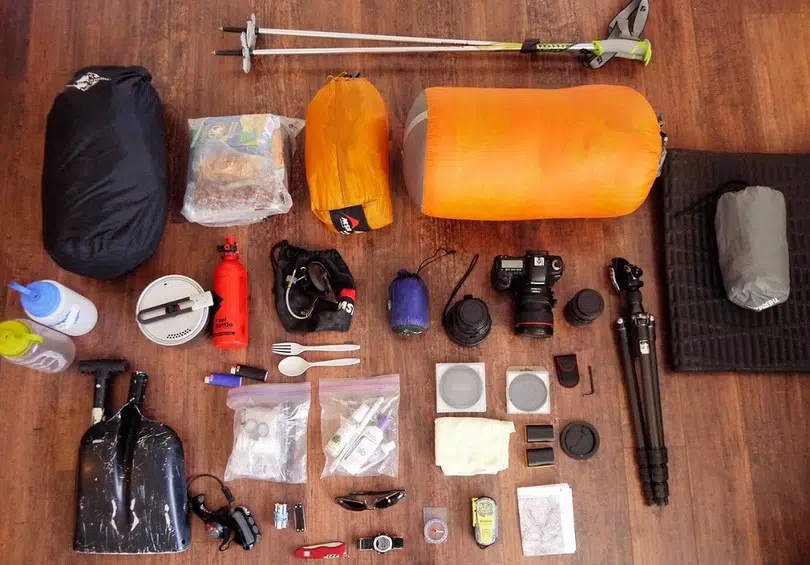
Even the smallest item you forget at home may make you feel uncomfortable so make sure your list is complete before you start preparing.
Other items you might want to take camping:
- A small sewing kit to fix things that get broken during the trip
- A small folding shovel to dig latrine holes and flatten the area you want to put your tent on
- Binoculars so you can admire the area and find the best spots to visit
- Maps and a compass so you don’t get lost in a wild area
- Folding chairs for fishing and your own comfort
- Bug repellant medication and candles – there are areas where you’ll get attacked by ants, flies, or mosquitoes and these items will be priceless when this happens
- Water purification tablets and /or filter to make sure the water you drink is pure
- Emergency whistle to let people know if something is wrong or if there’s any danger lurking around
- Toys and games to spend the time – there will be no television and no internet so these items will keep you away from boredom.
Camping is a really fun and relaxing activity that can lead to making new friends and seeing amazing views. Respect camping regulations and put out fires before going to sleep to make sure you protect the environment. Also, if you don’t want your tent attacked by insects, keep it closed at all times. If you respect these few rules and make sure your camping gear is complete, there’s nothing to stop you from having a good time with your family.



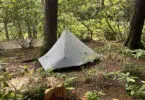

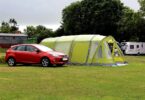
I’ve never gone camping, but recently I want to do it with my mother. I know that it is not allowed to camp without proper experience. So, If I’m a beginner and my experience is ‘zero’ – can I go camping without assistance of an expert for a couple of days? I don’t plan to move far away from a highway, my car and a settlement. The area is well-known by me, too. Thanks for an advice!
Well, no one will prevent you from going camping, regardless of the level of experience so go ahead! Just make sure you choose an area where you are allowed to camp.
For experienced campers forgetting the tent can be solved by taking turns sleeping in the car. Finding a cave, just be sure you don’t trespass. Improvise, it is time to be creative!
Hi Judith,
Thank you for the suggestions. Sleeping in a car is a great idea if the campsite is close enough to the parking area. Caves are okay as well but we also need to be wary of wild animals that may be taking refuge there.
In a pinch, you can build a makeshift tent using some tree branches and dried leaves. It would not keep you dry as much as you would want to but it is enough to get you through a sudden shower or through the night.
Samuel.